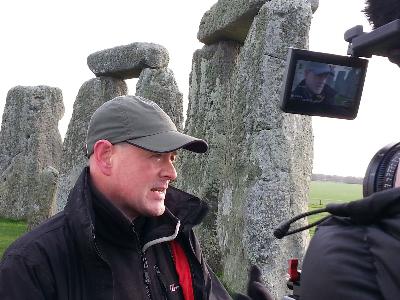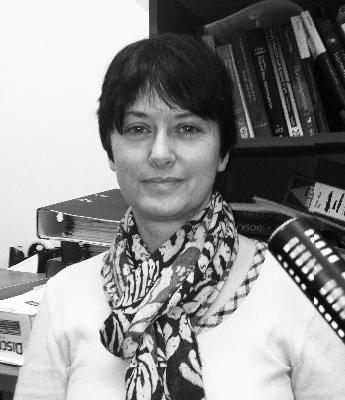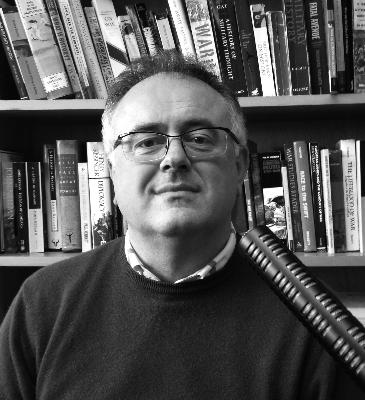Discover Ideas Lab Predictor Podcast
Ideas Lab Predictor Podcast

Ideas Lab Predictor Podcast
Author: Ideas Lab Predictor Podcast
Subscribed: 1Played: 12Subscribe
Share
Description
Each Ideas Lab Predictor Podcast features a different academic expert scanning thehorizon in their specialist field to give insider knowledge on new trends and key issues. It's a quick heads-up on what to watch out for over the next 18-24 months, given by those in the know.
The series covers a wide range of topics, from energy and archaeology to animal intelligence and food engineering.
The series covers a wide range of topics, from energy and archaeology to animal intelligence and food engineering.
99 Episodes
Reverse
It’s a common misconception that to be fit you must be slim. Research is proving the significance of regular exercise to our health and wellbeing whatever our size, with the risks of remaining sedentary being compared with those of smoking. Do we as the public have any proper understanding of this crucial health message?
We are joined by a panel of experts from academia and beyond, featuring Professor Janice Thompson, Professor of Public Health, Nutrition and Exercise, Dr Carolyn Grieg, Senior Lecturer in Nutrition and Ageing, and Dr Gareth Wallace, Lecturer in Sport and Health Nutrition, all from the University of Birmingham, and special guests Shaleen Meelu, nutritionist and co-founder of the Harborne Food School, and Mark Roscoe, Commissioning Lead for Lifestyles at Birmingham Public Health. We also hear from Professor Steven Blair from the Department of Exercise Science at the University of South Carolina.
How should these exercise health messages be delivered to a population with a diverse range of fitness levels? What is the best way to motivate those who do no exercise at all to start doing some? Is it time for the food industry to take a positive role and help us fund physical activities? All these and more are debated along with the very latest research around the interconnections between fatness and fitness.
On the 30th of October, Janice, Carolyn and Gareth will be running the ‘Obesity Wars’ event outside Birmingham’s ThinkTank. Funded by the Physiological Society, Obesity Wars will feature a range of free interactive and informative activities to engage the public with research on the benefits of physical exercise and to dispel myths about weight, size, BMI and activity levels. Transcript : http://tinyurl.com/kdga6cd
Lucy talks to Dr Caroline Radcliffe about her research on Willkie Collins’ plays, specifically the ‘The Lighthouse’, a play that Collins wrote and staged together with Charles Dickens. Although a collaborative effort, Caroline explains that Collins was responsible for the majority of the play. ‘All Dickens contributed was a prologue and a song, and we actually reconstructed the song at Birmingham, so it was the first time this Dickens song had been heard for over 150 years.’ Caroline describes Collins’ plays as perceptive society dramas, the forerunners of the works of writers like George Bernard Shaw and Oscar Wilde, and explains how studying Victorian drama reveals much about the politics and psychology of the time. She also has time to talk about her upcoming appearance on a new BBC Four series with Lucy Worsley and Len Goodman, looking at the social history of dance.
A host of previously unknown archaeological monuments have been discovered around Stonehenge as part of a unique digital mapping project. Mr Paul Garwood, Senior Lecturer in Archaeology at the University of Birmingham, tells us about the ‘Stonehenge Hidden Landscapes Project’, which over the past five years has been using cutting-edge geophysical technologies to map the area at an unprecedented spatial scale and resolution. Paul explains ‘Stonehenge did not stand in isolation but rather was part of a very densely inhabited landscape where a range of activities were taking place, (with) a multiplicity of different small foci, like small shrines, small cult centres, around the central one’. Alongside the Ludwig Boltzmann Institute for Archaeological Prospection & Virtual Archaeology in Vienna and other partners, the University of Birmingham team has made it possible for the first time to create a total digital model of the Stonehenge area, both on and below the surface. Transcript: http://bit.ly/1BsfCOC
3D printing is still in its infancy, but it has already provided astonishing opportunities for the manufacturing sector, affecting healthcare, transport and construction. Sam talks to Dr Moataz Attallah, Professor in Advanced Materials Processing at the University of Birmingham, about the future of the sector and a 3D printed medical implant developed as part of his research. Moataz explains ‘3D printing allows us to print very specialized patterns on the surface of medical implants. These patterns enable bone in-growth into the implants and they will improve and increase the implant life.’ Not only will the technology provide a longer lasting implant, but the implant will also have the ability to release drugs slowly into the body. Could 3D printing really bring about the third industrial revolution? Transcript: http://bit.ly/1x10RDt
We know that a lack of water is not great for a plant. How do plants cope? Sam talks to Dr Laura Vickers, Lecturer in Plant Biology in the School of Biosciences at the University of Birmingham about her research on the effect of ‘water stress’ on plants. Laura’s research involves putting plants through levels of water deprivation to see how they respond. With water a scarce resource, developing crops with water-resilient characteristics would be hugely beneficial for farmers. Laura explains ‘by picking apart the mechanisms and by really understanding what’s going on, we can get these characteristics in our crop varieties.’ But each plant responds differently to stresses, so there’s a lot of work to be done. Transcript: bit.ly/1rIXaAb
Rheumatoid arthritis is the inflammation of the joints as the immune system starts to attack them. Sam talks to Professor Karim Raza, Professor of Clinical Rheumatology and Honorary Consultant at the University of Birmingham. Karim explains his research aims to identify those at high risk of rheumatoid arthritis before it develops. ‘We might be able to target them and say look your at high risk of developing this problem in the future - rather than waiting why don’t we do something about it now?.’ Exposure to cigarette smoke is one of the risk factors. And getting to people showing the earliest signs could in the future allow a complete cure, rather than just controlling their disease with a lifetime of medication. Transcript: bit.ly/1piV95N
If a patient has had cancer, they are not eligible to donate organs, but this is changing thanks to the work of Dr Rajeev Desai, a Clinical Research Fellow in the School of Cancer Sciences. Sam talks to Rajeev about his research investigating the risk of cancer transmission from donors to their recipients. Rajeev explains 'We are trying to get the balance right by assessing donors who are traditionally counted as high risk. Can we include organs from such donors without resulting in significant cancer transmission?’. Rajeev’s work has shown that in some cases organs from people who have previously had cancer can be safely considered for donation. As a result of his study NHS Blood and Transplant has changed the national guidelines, which will mean a greater number of much-needed organs are available for those on transplant waiting lists. And Rajeev's research could have global impact if other countries follow suit. Transcript: http://tinyurl.com/ogdx3j7
There is still much we don’t know about the origin of the dinosaurs and how they became so successful. Sam talks to Birmingham Fellow Dr Richard Butler, Vertebrate Paleontologist in the School of Geography, Earth and Environmental Sciences and Academic Keeper at the Lapworth Museum of Geology. Richard tells us about the exciting discovery of a new species of dinosaur in Venezuela. The dinosaur, currently unnamed, is one of the earliest members of the Ornithischia, a group of plant-eaters. It was found in rocks 200 million years old, from the early part of the Jurassic period, just after the Triassic-Jurassic mass extinction. 'It shows us that ornithischians actually responded to this event by becoming more diverse’ Richard explains. But what was it about this group of dinosaurs that allowed it to thrive when others perished? Transcript : http://bit.ly/1otOpoR
Whether it’s religion, fashion, cooking or even medicine, smell plays a significant role in culture, past and present. Sam talks to Professor Jonathan Reinarz, Director of the History of Medicine Unit in Primary Care Clinical Sciences at the University of Birmingham, about his book Past Scents: Historical Perspectives on Smell. In this interview, Jonathan explains that the history of smell has been defined as an effort to distinguish between good and the bad scents. But what determines whether a smell is foul or fragrant, and how will our relationship with smell change in the future? Transcript : http://tinyurl.com/p53m2qv
Do you always wear a helmet when cycling, playing contact sports or doing activities which may risk you getting a blow to the head? Sam talks to Dr Alex Conner, Senior Lecturer in Medical Sciences at the University of Birmingham, about brain swelling. Alex runs a small research group looking at protein structure and function, with a specific focus on a protein called aquaporin 4 which is found in brain cells. Alex explains ‘we have to regulate the size of the cells and the one way we do that is through water. Aquaporins let water come in and out of the cell.’ But after a stroke or a concussion this process can go wrong, with too much water entering brain cells leading to harmful swelling. If the objectives of Alex’s research group are reached and a method of regulating aquaporin 4 is identified, it could prove a life saving discovery. Transcript: http://bit.ly/1pLcTJZ .
The symptoms of Attention Deficit Hyperactivity Disorder (ADHD) include inattention, hyperactivity, and impulsivity but can be difficult to diagnose. Sam talks to Brandan Ashinoff, Doctoral Researcher in the School of Psychology at the University of Birmingham about his research in hyperfocus, a particular trait of people who have ADHD. ‘Hyperfocus is a state of intent concentration where you lose track of time, you really enjoy what your doing’ Brandon explains. But how does this relation to attention? Brandon observes ‘This is weird in the context of ADHD because it’s actually too much attention. You’re focused so intently on something that no information gets into your brain essentially.’ But when how does hyper focus in those with ADHD differ from those without? Transcript : http://bit.ly/1gZ9H8i
What are the challenges faced by academics when presenting their subject on television? Lucy hosts a live Q and A with Dr Richard Clay, Senior Lecturer in the History of Art at the University of Birmingham, before an invited audience of university staff and postgraduate students. The Q and A follows a screening of BBC Four documentary Tearing Up History, presented by Richard himself, and based on his research on iconoclasm and the French Revolution. Richard explains 'in that fifty seven minutes we're trying to sum up what is probably 25 years of my life's work.' But has his experience changed the style in which he teaches? Tearing Up History was produced by Furneaux & Edgar Productions, and was brought to the screen through the proactive work of Ideas Lab. It will be shown on BBC Four on May 6th 2014 at 9pm.
2014 marks the 450th anniversary of William Shakespeare’s birth. Lucy talks to Professor Michael Dobson, Director of the Shakespeare Institute, to find out what is going on. There’s a large number of events open to the public for the celebrations, with a production of Henry IV Part I followed by a firework display on the actual birthday itself, the 23rd, and on Friday 25th April a public lecture at the Institute given by Michael Bogdanov. The big procession in Stratford happens on the morning of Saturday the 26th. Michael also describes some of the international events happening for the anniversary, and looks forward to the even bigger celebrations in 2016 which will see the World Shakespeare Congress come to Stratford and London.
To kick off the week of the 450th anniversary there’s a special documentary on BBC Radio 3 featuring Michael and colleagues from the Institute including Professor Ewan Fearnie, Dr Erin Sullivan and Dr Martin Wiggins. Shakespeare: For and Against is on Radio 3 on the 20th April at 2pm. Later that day you can also hear a special production of Anthony and Cleopatra starring Kenneth Branagh and Alex Kingston – BBC Radio 3, 7.30-9.55pm.
Could simply breathing into a machine help diagnose liver disease? Sam talks to Dr Margaret O'Hara, a Medical Physicist in the School of Physics and Astronomy at the University of Birmingham. Margaret explains 'people with advanced liver disease have a particular smell on their breath, called 'fetor hepaticus''. Could this technology have implications for early identification of other diseases?
How does language affect how we talk about, think about and treat animals? Sam visits the Department of English to talk with Senior Lecturer Dr Alison Sealey and Research Fellow Dr Chris Pak about their research project ‘People, Products, Pests and Pets’. Their Leverhulme funded project is collecting a wide range of discourse about animals, from descriptions on food packaging in the supermarket to fundraising leaflets from animal rescue shelters, to investigate how the linguistic choices within them relate to particular scientific, philosophical, ethical, popular and practical stances. Chris explains ‘We are able to explore how these professionals who worked in various industries have responded to debates in ways in which animals are actually treated in society, and the way they have moderated the language that they use in response to that.’
We all know that an increase in CO2 emissions leads to global warming, but just what can we do about it? Sam talks to Dr Francis Pope, Birmingham Fellow in Geography, Earth and Environmental Sciences, about his research into geoengineering - the deliberate changing of the Earth's climate. Francis explains that in order to counteract the negative effects of climate change we could alter the Earth's atmospheric system to cool the planet by reducing radiation. While injecting aerosol into the atmosphere has not yet been attempted, scientists have an idea of the potential effects of geoengineering by gathering data collected after the eruption of volcanos. Particles pumped into the stratosphere by eruptions block sunlight and so can reduce temperatures - sometimes by up to half a degree. What are the sides affects of this? Should politicians start considering geoengineering now as a potential solution, or only once serious climate catastrophe is already underway? Download a transcript of this podcast here: http://bit.ly/1jLKIbj .
If you were asked to name a Black British intellectual, who would you come up with? Sam talks to Dr Paul Warmington, Senior Lecturer and Deputy Director of the Centre of Research in Race and Education in the School of Education at the University of Birmingham about his book 'Black British Intellectuals and Education: Multiculturalism's Hidden History' [ http://bit.ly/1cw1uG7 ] . Paul explains ‘It’s in the site of education that black Britain as we know it today has come into being’ and he discusses the impact of educators and campaigners such as George Padmore, C.L.R. James, Stuart Hall, Hazel Carby, Gus John and Paul Gilroy. Download a transcript of this podcast here: http://bit.ly/1kNyou1
As we reach 100 years since the outbreak of the First World War, how will the way we commemorate this period in history change? Sam talks to Dr Jonathan Boff, Lecturer in Modern History at the University of Birmingham and member of the Centre for War Studies. Jonathan explains the significance of WWI and its future commemoration: ‘Precisely because it is complicated and confusing and difficult, and there are conflicting interpretations of it, we are unlikely to achieve the same level of closure about it as for example about the Napoleonic wars.’ Just how will our commemoration of the First World War look in 50 years’ time?
The Birmingham Great War Centenary Lecture Series is open to the public. The 2014 lectures focus on ‘Roads to War’ and run from the 28th of January.
Download a transcript of this podcast here: http://bit.ly/MbLliJ
We think of scientific experiments as lab-based affairs in sterile environments, but what are the questions surrounding extreme medical research? Sam talks to Birmingham Fellow, Dr Vanessa Heggie, a historian of modern science and medicine in the Medical and Dental School at the University of Birmingham. Vanessa's research considers the history and ethics of physiological research at the boundaries of survival, specifically research conducted at the limits of altitude and temperature. Vanessa explains: 'They use the mountain as a model to make mountaineers unhealthy, to then study them in a way that they couldn't study people who are in accident and emergency.' But just how new are these methods of radical and potentially dangerous medical research?
Download a transcript of this podcast here: http://bit.ly/1gtCfHb
























